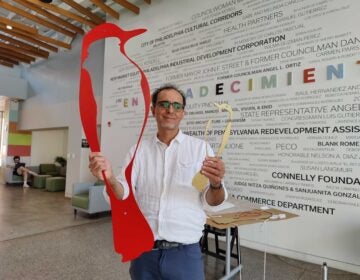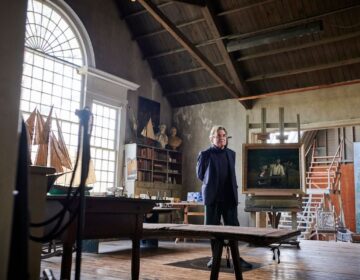Ira Glass brings ‘Reinventing Radio’ show to Kimmel

Ira Glass attends the George Foster Peabody Awards in May 19. He will appear Saturday at the Kimmel Center. (Photo by Evan Agostini/Invision/AP)
Ira Glass began producing and hosting “This American Life” in 1995, a time when public radio was pretty boring.
His signature style of long-format storytelling was bold in its conversational tone and creative editing, and it sparked a new wave of producers.
“At the time that we came on the air, there weren’t people doing stories on the radio. Radio is such a powerful medium for stories,” said Glass. “That’s the one thing we did — remind people of that. But these things that are being made [now] are so original, I wish I could claim credit.”
“Reinventing Radio,” a stage talk with sound clips about how Glass makes “This American Life,” started at the same time the radio show did, as a way to promote the new venture. The show evolved along with “This American Life” and the radio climate.
The iteration at the Kimmel Center, to be presented Saturday as part of the First Person Arts Festival, will feature memorable moments from the show’s 19-year history, including gems that cannot be broadcast anymore due to changing FCC rules regarding content.
“There’s an old David Sedaris story that we broadcast in the first years of our show that now is illegal to play on the radio,” said Glass in a phone interview. “WHYY would be fined a quarter-million dollars if I played it for you right now.”
The “This American Life” team has branched out into TV, movies and theater. It’s latest spinoff, one of its most successful, is a podcast.
“Serial” is a serialized podcast investigating a 1999 murder in Maryland. The reporter, Sarah Koenig, revisits the evidence that helped convict a teenager accused of killing his ex-girlfriend and responds to it in real time, as she produces each episode.
“What makes it interesting is that as the evidence comes in, as Sarah uncovers the evidence, she gets tossed this way and that about whether she believes the guy who was convicted for it killed the girl, or did not kill the girl,” said Glass. “We experience it with her. We go through the ups and downs, which is a very different thing.”
Glass said this approach to storytelling, an investigative podcast revealing its findings in real time, would not work on the radio. The reinvention of podcasting – as it were – has become a bona fide hit, with more than a million downloads.
WHYY is your source for fact-based, in-depth journalism and information. As a nonprofit organization, we rely on financial support from readers like you. Please give today.





